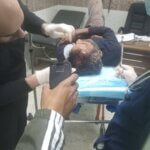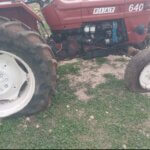Sixty-three sheep poisoned near Peza’el settlement
 Since Thursday, 10th October 2012, sixty-three sheep have died of poisoning after eating bread left out by settlers near Peza’el settlement. The herd of 44-year-old shepherd and father of ten, Akef Mahmoud Da’jneh, from Fasayil Al Fauqa counted ninety sheep before the incident. The lives of four of the twenty-seven remaining sheep are still at risk.
Since Thursday, 10th October 2012, sixty-three sheep have died of poisoning after eating bread left out by settlers near Peza’el settlement. The herd of 44-year-old shepherd and father of ten, Akef Mahmoud Da’jneh, from Fasayil Al Fauqa counted ninety sheep before the incident. The lives of four of the twenty-seven remaining sheep are still at risk.
On Thursday, 10th October 2012, two of Akef’s children were herding the family’s livestock. Around midday the sheep ate from bread that was left out in the land near Peza’el settlement. On return to the house in the evening, the family realised that their animals were sick, and called for a veterinary doctor from Nablus. The vet administered numerous injections and medication, but to no avail. That same evening, during the night, all through Friday and on Saturday, the vast majority of their sheep died.
The speed with which the animals died, the futility of medical treatment, the circumstances of their death and similar occurrences in the past make it very clear that the sheep did not die of an ordinary disease. Confiscating and killing livestock highlights the daily harassment Palestinians living in the Jordan Valley face, and forms part of an ongoing campaign to undermine the livelihood of communities living in Area C.
The family of Akef Mahmoud Da’jneh, who has been a shepherd his whole life, alone, has endured similar violence on a number of occasions.
In 2004, Akef lost eight cows after three were killed by settlers and five more by Israeli soldiers. Though he brought a case to the Israeli Courts, he was only told to ‘come back another day’ a number of times, and none of the perpetrators were held accountable for their actions.
Similarly, in 2010, one of Akef ‘s neighbours was herding his sheep when settlers stole three sheep near the main road. When he tried to go after them, they pointed a gun at him, and thus succeeded in taking the animals without any further repercussions.
Moreover, even though the Palestinian Ministry of Agriculture in Jericho is aware of this particular aspect of the occupation, and it has been widely documented by international media, no actions have been taken and the circumstances and everyday life of the communities affected, has not changed.
Naturally, following this incident, shepherds grazing their sheep in the same area, are scared that more poison will affect their herds too. As a result, they are now limited even further in accessing land crucial to the survival of their livestock and their ability to sustain their livelihoods.
Palestinian communities in Fasayil have been subject to frequent harassment and attacks from both settlers and the occupation forces, which has included repeated waves of house demolitions and denial of access to water and electricity. In an attempt to legitimise this, the Israeli Military Administration has declared all the open grazing areas as ‘Closed Military Areas’.
There are around 2000 Palestinians living in Fasayil al Tahte, Fasayil al Wusta and Fasayil al Fauqa, but they are gradually losing more and more of their land to the settlements on either side of them: Tomer and Paza’el. Just one of these communities, Fasayil al Tahte, was demarcated as ‘Area B’ under the Oslo Accords, giving the inhabitants very limited rights to have services and infrastructure provided by the Palestinian Authority (roads, water, electricity, schools, etc). The other two communities, and all the land surrounding them was marked as Area C, with the Israeli occupation forces having full and unlimited control.
These communities believe that the occupation forces are attempting to force them from their land, and push them all into the ‘Area B’ areas. This would leave them living in an overcrowded ghetto with no land to farm and sustain themselves. They would thus become little more than a cheap and pliable workforce for the settlements which have taken their land.




